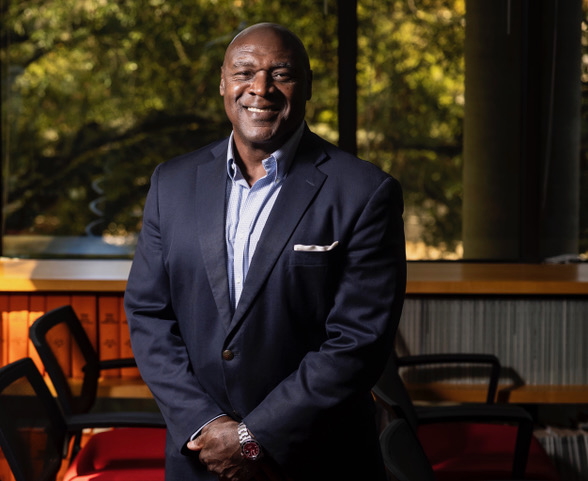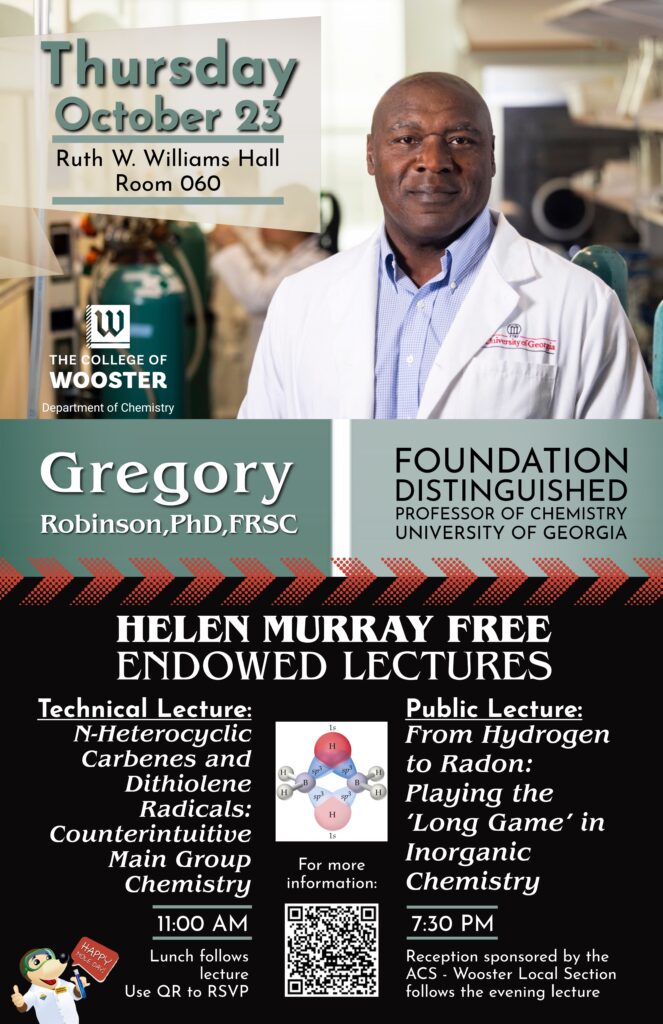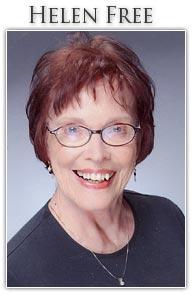
2025 Events: October 21-23
Gregory H. Robinson, PhD, Foundation Distinguished Professor of Chemistry, University of Georgia
Congratulations to Professor Robinson for his outstanding achievements in inorganic chemistry. He will receive the M. Frederick Hawthorne Award in Main Group Inorganic Chemistry at the National ACS Spring 2026 meeting in Atlanta, GA. Learn more about his work: https://www.gregoryhrobinson.com/
Schedule:

- Tuesday, October 21
- 11 AM: Context Session: Journal Article Discussion
- Faculty will hold a context session on one of Dr. Robinson’s papers: 2007 JACS diborene, RWW 045, Refreshments provided
- 11 AM: Context Session: Journal Article Discussion
- Thursday, October 23
- 11 AM: Technical Lecture
- “N-Heterocyclic Carbenes and Dithiolene Radicals: Counterintuitive Main Group Chemistry”
- 12 PM: Lunch: Get to Know Me
- All students invited to attend – RSVP encouraged but not required by Tuesday, October 21, 4:30 PM
- Severance 105 (STEM Zone)
- 7:30 PM: Public Lecture
- “From Hydrogen to Radon: Playing the ‘Long Game’ in Inorganic Chemistry”
- Ruth W. Williams Hall of Life Science, Room 060.
- Reception immediate follows sponsored by the Wooster Section of the American Chemical Society
- 11 AM: Technical Lecture
Details:

Technical Lecture: N-Heterocyclic Carbenes and Dithiolene Radicals: Counterintuitive Main Group Chemistry
Get to Know Me Lunch
Public Lecture: From Hydrogen to Radon: Playing the ‘Playing the ‘Long Game’ in Inorganic Chemistry
Biography:

When Gregory H. Robinson, a native of Anniston, Alabama, was born (1958) the American South remained firmly in the throes of racial segregation. Consequently, he began his education by attending an underfunded, overcrowded racially segregated elementary school. Robinson obtained his B.S. in Chemistry (1980) from Jacksonville State University (Jacksonville, AL). While attending JSU, Robinson was also a four-year letterman on the Gamecock football team, earning All-Gulf South Conference and Gulf South Conference Defensive Player of the Year (1979).
Attending graduate school at The University of Alabama and studying synthetic inorganic main group chemistry in the laboratory of Professor Jerry L. Atwood, Robinson received his Ph.D. (1984). After spending a decade on the faculty of Clemson University (South Carolina), Professor Robinson joined the faculty of The University of Georgia (1995) and now holds the title Foundation Distinguished Professor of Chemistry.
Professor Robinson’s research, involving the synthesis, structure, and reactivity of unusual molecules of the main group elements, has been described as provocatively innovative. Research highlights include:
- (a) experimental realization of the concept of metalloaromaticity—that properly constrained metallic (gallium) ring systems can exhibit traditional aromatic behavior;
- (b) synthesis and molecular structure of the first compound containing a metal-metal triple-bond between two main group metals;
- (c) synthesis of the first compound containing a boron-boron double bond—the first “diborene; and
- (d) room temperature stabilization of highly reactive molecules such as disilicon, diphosphorus, and diarsenic.
Professor Robinson’s peer-reviewed research articles, now numbering over 175, have been published in prestigious journals including Science, Nature Chemistry, the Journal of the American Chemical Society, and Organometallics. Professor Robinson has received numerous awards.
Selected Awards:
- American Academy of Arts and Sciences (elected in 2025)
- National Academy of Sciences (elected 2021)
- Fellow of the Royal Society of Chemistry (2017)
- F. Albert Cotton Award in Synthetic Inorganic Chemistry by the American Chemical Society (2013)
- Humboldt Research Prize (2012)
- Lamar Dodd Creative Research Award—the highest research award of The University of Georgia (2010)
- Southern Chemist Award (1998)
Helen Murray Free

Helen Murray Free, a 1945 College of Wooster graduate and a pioneering scientist who was inducted into the National Inventor’s Hall of Fame in 2000, was honored with the inaugural Helen Murray Free Endowed Lecture, featuring Dr. Mary Lowe Good.
The lecture series was established by Helen’s children and endowed through the Al and Helen Free Foundation. Each year, this endowed fund brings a renowned chemical scientist to campus to interact with chemistry students at a technical level and present an all-college convocation on the contributions of science to the quality of life.
Free, whose research in clinical chemistry not only revolutionized diagnostic testing in the laboratory, but also in the home, developed the “dip-and-read” glucose tests for diabetics. She was awarded seven patents for her clinical diagnostic test inventions, and also helped to develop a product for diagnosing Hepatitis ‘A’ while working for Miles Laboratories. In addition, she provided invaluable leadership in the testing of newborn infants for genetic or metabolic disorders that might lead to mental retardation.
Throughout her career, Free has been an active advocate of science education. From 1987 to 1992, she chaired the American Chemical Society’s (ACS) National Chemistry Week Task Force. In 1980, she was chosen as one of Wooster’s Distinguished Alumni Award winners; in 1992 she received an honorary degree from Wooster; and in 1993 she was elected president of the American Chemical Society.
Free has authored more than 150 professional articles, and co-authored two widely used textbooks in the field. Her accomplishments have been recognized in a number of ways, including the awarding of the ACS Garvan Medal and the Professional Achievement Award in Nuclear Medicine from the American Society for Medical Technology, as well as the establishment of the ACS Helen M. Free Public Outreach Award.
